北师大版高中英语必修1模块1Unit1LifestylesLesson3A教学设计
北师大版高中英语必修1 Unit 1《Lifestyles》(Period Three)课件
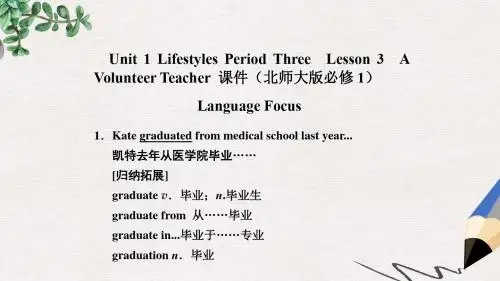
(2)The programme is designed to help people who
have been out of work for a long time. 这项计划的目的是为长期失业者提供帮助。
6.Pay attention to these sentences from the interview. 注意采访中的(下面)这些句子。 [归纳拓展] pay attention to 注意,to 为介词,其后跟名词、代词 或动名词。 draw/attract/catch one’s attention 吸引某人的注意 fix/focus one’s attention on 将注意力集中于
(1) Volunteers don’t expect any kind of pay. (2)Tang Ling volunteered to help the welfare house. (3)Students’ Union asks for voluntary service to help
[语境助记] (1)You must pay attention to the children wherever
they are playing. 无论孩子们在哪里玩你都必须注意。 (2)With so much noise outside,I can’t focus my attention on study. 外面太吵了,我无法集中精力学习。
[语境助记] (1)He is a graduate of Harvard in medicine.
他是哈佛大学的医学毕业生。
(2)He was born in 1942 in Oxford and graduated from Oxford University. 他 1942 年出生于牛津,毕业于牛津大学。
北师大版英语高一上册Module 1《Uint 1 Lifestyles》(lesson3)ppt课
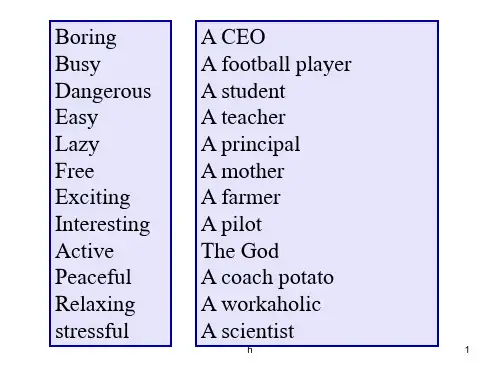
h
3
Pair work
Junk food popcorn
A couch potato is a person who likes watching TV… A coach potato is a person who …
Couch potato is an expression used to describe someone who sits in front of the TV all the time eating junk food, such as potato chips. It is only used to describe people, those who are lazy.
h
9
He is Tom Cruise. He is an actor. He…
h
10
He is …
She is…
h
11
Discussion
❖My parents’ lifestyle ❖My present lifestyle
❖The best lifestyle
h
12
I mean?
2. Student: My dad says these are the best day of my life-but
I'm __no_t_s_o_s_u_r_e__! You know, I've got lots of work to do and
there's not much time really. I also play football for the school
Boring
A CEO
Busy
A football player
高中英语北师大版必修一Unit1-lifestyles课程教学设计
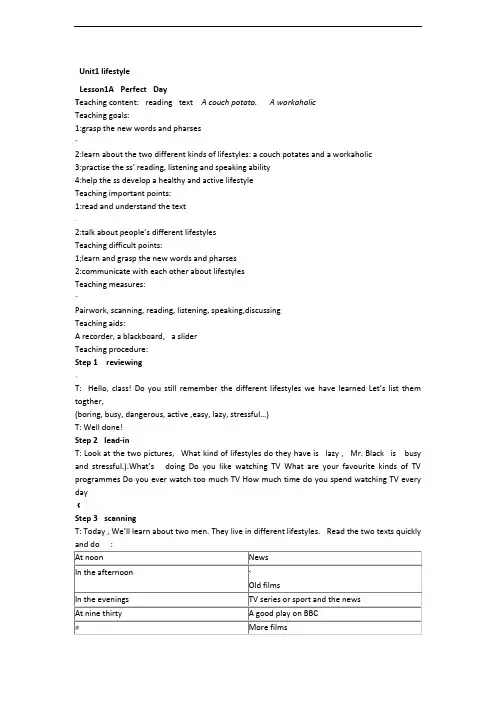
Unit1 lifestyleLesson1A Perfect DayT eaching content: reading text A couch potato. A workaholicTeaching goals:1:grasp the new words and pharses~2:learn about the two different kinds of lifestyles: a couch potates and a workaholic3:practis e the ss’ reading, listening and speaking ability4:help the ss develop a healthy and active lifestyleTeaching important points:1:read and understand the text.2:talk about people’s different lifestylesTeaching difficult points:1;learn and grasp the new words and pharses2:communicate with each other about lifestylesTeaching measures:~Pairwork, scanning, reading, listening, speaking,discussingTeaching aids:A recorder, a blackboard, a sliderTeaching procedure:Step 1 reviewing、T: Hello, clas s! Do you still remember the different lifestyles we have learned Let’s list them togther,(boring, busy, dangerous, active ,easy, lazy, stressful…)T: Well done!Step 2 lead-inT: Look at the two pictures, What kind of lifestyles do they have is lazy , Mr. Black is busy and stressful.).What’s doing Do you like watching TV What are your favourite kinds of TV programmes Do you ever watch too much TV How much time do you spend watching TV every day《Step 3 scanningT: Today , We’ll learn about two men. They live in different lifestyles. Read the two texts quickly1, have meetings and make phone calls 2:deal with rugent matters 3:do paperwork and some personal e-mails 4:read documents at home)Step 4 readingT: Quite good. Now read the text again. Underline the new words and phrases, then answer the questions in;(Suggested answers: : Brian do nothing but watch TV for 16-17hours and his wife makes money and prepares meals for him. No2: You know everything happening in the world and feel powerful and successful)Step 5 language learning1: switch on : turn onSwitch the TV on quickly, the game will be on TV soon2: switch off: turn off!Before leaving, you should switch the tap off.3:switch over: change the channels from one to another.The programme OUTLOOK is on TV. L et’s switch it over to Chaanel 9.4:be filled with; be full of5:take up: cover,occupy Playing football takes up most of his time—6:get changed; change one’s clothes7:make one’s way through:do sth.. from the beginning to the endI have been sitting , making my way through my lesson for hoursT: Let’s do complete the sentence below in the correct form . After that we’ll play the tape for you to listen and then I’ll get some ss to read the text aloud.Step 6: consolidation{T: We’ve learned Mr. Blakey and Mr. Black’s routine work. Do you think if their lifestyles are healthy What can they do to improve their lifestyles Discuss and then share your opinions with class.(For Brain he should spend less time on TV. First , he should get up soon after waking up and do morning exercises. Second ,he should try to find a job and go to work every day.. For Bob , he should sleep later every morning. He should eat a big breakfast and be more relaxed. He should also sleep earlier every night, and spend more time with his family. )T: Well, let’s go on to another topic . Ask your partner what he or she do at different time in a day, and decide wheather your partner is a couch potato or a workaholic Use the following samples: What do you do at …Step 7 homework1:Review new words and phrases《2:Do the Ex. 10 describe your parents’ lifestyles to your partner by working in pairs Blackboard DesignLesson 1 A Perfect Day1: switch on : turn on 2: switch off: turn off3:switch over: change the channels from one to another.(4:be filled with; be full of 5:take up: cover,occupy6:get changed; change one’s clothes7:make one’s way through:do sth.. from the beginning to the end.[Lesson 2 RelaxingTeaching aims:To practise listening for specific informationTo learn about ways of dealing with stress in everyday lifeTeaching course:、Ⅰ Warm upWork is very important in our life. We have to work, no matter what you are. With the development of modern society, people are fastening their steps of life. There is less time for relaxation. The problem is that more and more people feel stressed. How to get rid of the stress we are suffering from is what we are to talk about.Ⅱ TalkingTask oneYou are to do some listening, Before it think about your school life, list the things ( at least 3 ) you do and your feeling about them.~How do you get rid of the stress in your lifeTalk to each other about the activities you have listed. Say which is stressful and which is relaxing. Do it like this:prepare for an exam; lie on the beach; wait for the result of; give a talk in English; do shopping with task two.Interview your classmates to see what kind of stress they are suffering from and how they relax themselves or get rid of it.ⅢListening*Do the exercise 2Do the exercise 3Read through the Strategies with the class and see if they can use any of these Strategies already. In pairs, students read the questions and try to predict the answers. Point out that morethan one answer is possible.<Students then exchange ideas to find out if they have made the same predictions if they have made different predictions, ask students to justify their opinions.Do the exercise 5 and 6Before listening the materials ask students to read the questions and first predict answers then listen the tape twice.When students have checked their answers, ask them what advice they would give to Mark to help him be less nervous before exams and before going to parties.Do the exercise 7*Students look at the exercise and see if they can remember or can guess any of the missing words.Students listen to the cassette again and complete the sentences in the Function File. PronunciationDo the exercise 9In our oral language we often pause. Now listen to Mark again. Which words or sounds does he use to hesitate!Students listen to the cassette. After each sentence, pause the cassette so that students can repeat the hesitation device.Do the exercise 10Before starting their talk, students can look at the sentences they wrote in Exercise 9Students then put the exercise away and talk to their group without any notes, using as many hesitation words as possible.Ⅳ Homework:、Writ a report about you interview in class. Write about the stress you and most of your classmates are suffering from. Find the causes of the stresses and give advice on how to relax yourselves.…@!(.)'Lesson 3 A Volunteer TeacherTeaching aims:*To listen for specific factsTo give opinion about voluntary workTo talk about future arrangements and intentions, using the Present Simple, the Present Continuous and going toTeaching difficulties:To talk about future arrangements and intentions, using the Present Simple, the Present Continuous and going to¥Teaching Aids: computer and cassetteTeaching procedures:Ⅰ. SpeakingT: What does the girl doS:》T: Yes she is a volunteer teacher. T his is a real story. The girl’s name is Wang Shu, grew up in Hangzhou, Zhejiang Province. Upon graduation from the English department of Beijing Normal University, she left Beijing for Inner Mongolia working as a volunteer teacher. She is still there now. What do you know about this part of ChinaS:T: show a slide to introduce Inner Mongolia (Inner Mongolia (Nei Mongol) is the first national autonomous region established in China. It stretches along China's northern border with Mongolia and Russia and covers an oblong area of over million square kilometers, one eighth of China. Of all the Chinese provinces and autonomous regions, Inner Mongolia is the third largest after Xinjiang and Tibet.) Inner Mongolia falls behind developed areas so it needs volunteers go to work there.T: What can you say about the girl in the photoS:(Ⅱ ListeningStudents read the questions and predict the answersT: I think you must be interested in Wang Shu, now listen to the interview, you will learn more about her and answer these questions.Students listen to the tape and check their predictions.Students listen to the tape again and make sure of the answers&Students work in pairs and take turns to retell Wang Shu’s storyⅢ Voice your opinionIs it a good idea to do voluntary work What reasons do people have for doing voluntary workⅣ VocabularyDo the exercise 5.、Students work individually, thinking about the cues and what they are going to do.Students read the sentences, decide which words to use, and then complete the sentences. Translate sentences1.我们要两点半出发。
英语:unit1《lifestyles》-lesson3a-volunteer-teacher-language-points课件(北师大版必修1)
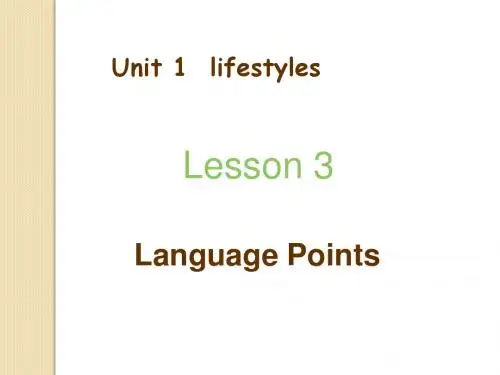
switch n. & v. n. 开关,电门,转换器;转变,改变 a switch from gas to electricity, make a switch from…to… v. 转换,改变 He switched the lights from green to red. 他将灯从绿色转 变成了红色。 相关短语: switch on =turn on接通电流,开 First you should switch the machine on.首先你要接通机 器电源。 switch off =turn off切断电源 He switched it off because he didn’t like the television programme.他把电视关了, 因为他不喜欢那些电视节目。 switch over 转换频道,转变,交换位置,转换 You drive first and then we can switch over.你先开车, 然 后我们换着开。
云创通 云创通 yrk647utb 云创通总部坐落于广东深圳现代化综合商贸物流基地 伊舒在成功的第一时间便抱住伊诺和妈妈大声的痛哭了一场,有愧疚、有遗憾、更多的却是喜悦,他哭得哽咽到只重复 的喊着“姐、妈”!
伊诺也在那样一种时刻哭的泣不成声,她人生最美好的意愿,终于在油枯灯尽之际迎来重生的火苗,她那些年的努力和 坚持总算有了最好的回报! 将伊舒接出院的那一刻,她觉得天空中的太阳都是温暖到让人想要睡觉,尽管那是一个冬天,天气还算寒冷的季节,但 是,她十五岁之后从来都没有像那样一种时刻觉得阳光是那般的温暖可人。 母亲张娴梅紧紧握着他们姐弟俩的手,眼泪却还是不停地流了下来,伊诺忍不住伸手揽了母亲的肩“妈,不哭了,现在 的我们就要过好日子了,以后,我们都不要哭了!”伊诺说完这样的话,还是没忍住的落下泪来。 母亲张娴梅忽地想起一件事来,吸了吸鼻子开口道“诺诺啊,你小叔家的铎铎就要结婚了,小叔这些年也没少帮我们, 刚好小舒也好了,今年,你看要不要请个假,我们一起回趟老家参加铎铎的婚礼?”母亲问得甚是小心翼翼,她从来都 知道自己的女儿在工作上是多么的努力以及付出。她那个总是让她心痛到无以言表、自己却又无能为力给于帮助的女儿, 这些年里所有的辛酸与磨难她比谁都要清楚,想到这里她难免还是忍不住落下心酸的泪来! 伊诺没做多想便点点头“这个当然可以!”,伊舒的病已经得到救治,工作上,她也终于可以停下脚步歇一歇了、真好!
北师大版高中英语必修1 Unit 1《Lifestyles》(lesson 3 a volunteer teacher)英文教案
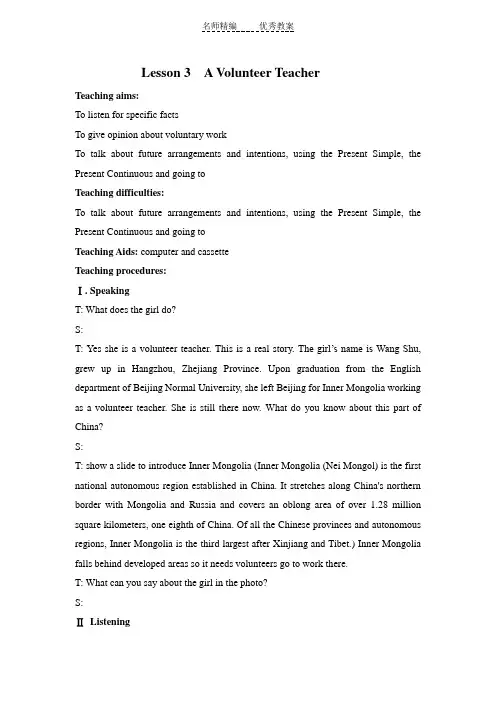
Lesson 3 A Volunteer TeacherTeaching aims:To listen for specific factsTo give opinion about voluntary workTo talk about future arrangements and intentions, using the Present Simple, the Present Continuous and going toTeaching difficulties:To talk about future arrangements and intentions, using the Present Simple, the Present Continuous and going toTeaching Aids: computer and cassetteTeaching procedures:Ⅰ. SpeakingT: What does the girl do?S:T: Yes she is a volunteer teacher. This is a real st ory. The girl’s name is Wang Shu, grew up in Hangzhou, Zhejiang Province. Upon graduation from the English department of Beijing Normal University, she left Beijing for Inner Mongolia working as a volunteer teacher. She is still there now. What do you know about this part of China?S:T: show a slide to introduce Inner Mongolia (Inner Mongolia (Nei Mongol) is the first national autonomous region established in China. It stretches along China's northern border with Mongolia and Russia and covers an oblong area of over 1.28 million square kilometers, one eighth of China. Of all the Chinese provinces and autonomous regions, Inner Mongolia is the third largest after Xinjiang and Tibet.) Inner Mongolia falls behind developed areas so it needs volunteers go to work there.T:What can you say about the girl in the photo?S:ⅡListeningStudents read the questions and predict the answersT: I think you must be interested in Wang Shu, now listen to the interview, you will learn more about her and answer these questions.Students listen to the tape and check their predictions.Students listen to the tape again and make sure of the answersStudents work in pairs and take turns to retell Wang Shu’s storyⅢVoice your opinionIs it a good idea to do voluntary work? What reasons do people have for doing voluntary work?ⅣVocabularyDo the exercise 5.Students work individually, thinking about the cues and what they are going to do. Students read the sentences, decide which words to use, and then complete the sentences.ⅤGrammarDo the exercise 6Listen to the interview again. Pay attention to these sentences from the interview. What verb forms are used to talk about the future?Guide students to draw the following conclusion:present Simplepresent Continuousgoing to + infinitivedo consolidate exercise7, 8and 9explain further grammar:Expressing future arrangements and intentions:be going to-- to express an intention to do something.Present Continuous-- to talk about future events that we have already fixed or arranged.Present Simple-- to talk about official events or timetables which we cannot change.be going to do 与be doing 的区别be going to do 表示事先经过考虑过,然后计划好将做某事;迹象将发生某事。
北师大版高中英语必修第一册Lesson 1 Lifestyles》
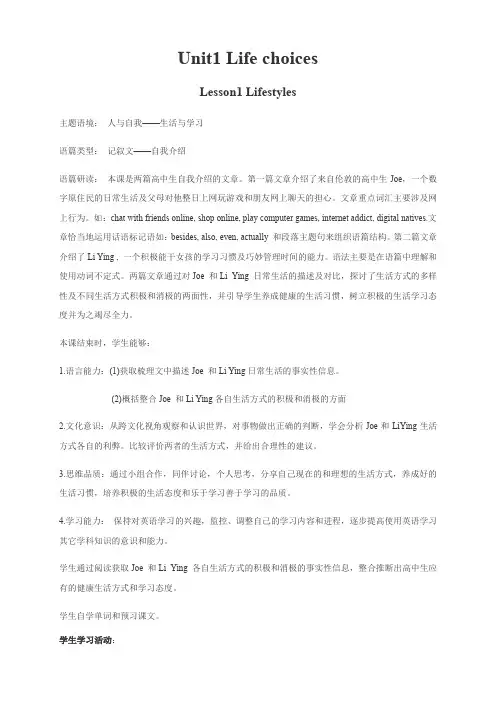
Unit1 Life choicesLesson1 Lifestyles主题语境:人与自我——生活与学习语篇类型:记叙文——自我介绍语篇研读:本课是两篇高中生自我介绍的文章。
第一篇文章介绍了来自伦敦的高中生Joe,一个数字原住民的日常生活及父母对他整日上网玩游戏和朋友网上聊天的担心。
文章重点词汇主要涉及网上行为。
如:chat with friends online, shop online, play computer games, internet addict, digital natives.文章恰当地运用话语标记语如:besides, also, even, actually 和段落主题句来组织语篇结构。
第二篇文章介绍了Li Ying , 一个积极能干女孩的学习习惯及巧妙管理时间的能力。
语法主要是在语篇中理解和使用动词不定式。
两篇文章通过对Joe 和Li Ying 日常生活的描述及对比,探讨了生活方式的多样性及不同生活方式积极和消极的两面性,并引导学生养成健康的生活习惯,树立积极的生活学习态度并为之竭尽全力。
本课结束时,学生能够:1.语言能力:(1)获取梳理文中描述Joe 和Li Ying日常生活的事实性信息。
(2)概括整合Joe 和Li Ying各自生活方式的积极和消极的方面2.文化意识:从跨文化视角观察和认识世界,对事物做出正确的判断,学会分析Joe和LiYing生活方式各自的利弊。
比较评价两者的生活方式,并给出合理性的建议。
3.思维品质:通过小组合作,同伴讨论,个人思考,分享自己现在的和理想的生活方式,养成好的生活习惯,培养积极的生活态度和乐于学习善于学习的品质。
4.学习能力:保持对英语学习的兴趣,监控、调整自己的学习内容和进程,逐步提高使用英语学习其它学科知识的意识和能力。
学生通过阅读获取Joe 和Li Ying 各自生活方式的积极和消极的事实性信息,整合推断出高中生应有的健康生活方式和学习态度。
2019年北师大版高中英语必修一Unit1 《Lesson 3 A Volunteer Teacher》 Listening and speaking 课件 共41
Further thingking.
volunteer, graduate, minus, basin, challenge, decision, support, dial
1. It can get as cold as _m_i_n_u_s__ 40 or 50 degrees at night.
2. Kate _g_ra_d__u_a_te_d_ from medical school last year and she is working in a big hospital now.
In short,
Each contribution — no matter how small — can make a difference.
Previous Secretary General of the UN ----Annan 安南
Let's get moving !
Learn them by your heart:
•At first, her parents didn't like this idea.But Wang Shu finally won their support after ___h_a_vi_ng(have) a long talk with them.
•Now she is prepared for her job.
Write a composition about your plan about how to help the children in the poor areas.
北师大版高中英语必修一Unit 1 Lifestyles 讲义
Unit 1 Lifestyles 讲义Lesson 1 A perfect day1. 一般现在时主要用于表示人、事物现在状况和特点;表示经常或习惯性的动作,句中常有often, always, from time to time 等时间状语;表示客观规律和永恒真理等。
He usually goes to work at 7 o’clock every morning.他通常每天早上7点钟去上班。
The earth goes around the sun.地球围绕太阳转。
表示永恒的真理,即使过去的语境中,仍用一般现在时。
I learned that the earth goes around the sun when I was in primary school.我在小学就知道地球围绕太阳转。
在时间、条件和让步状语从句中,一般现在时可以代替一般将来时。
If he accepts the job, he will get more money soon.如果他接受了这份工作,不久就会赚更多的钱。
在make sure (certain), see to it, mind, care, matter +宾语从句中,从句用一般现在时代替一般将来时。
So long as he works hard, I don’t mind when he finishes the experiment.只要他努力工作,我不介意他什么时候做完试验。
在the more… the more… (越......越......)句型中,若主句是一般将来时,从句通常用一般现在时。
The harder you study, the better results you will get.你学习越用功,成绩就越好。
2. 现在进行时的基本用法:a. 表示现在( 指说话人说话时) 正在发生的事情。
We are waiting for you.b. 习惯进行:表示长期的或重复性的动作,说话时动作未必正在进行。
高中英语北师大版必修1课件:Unit 1 Lifestyles Lesson 3 A Volunteer Teacher
单句写作 (6) These graduates all graduated from (这些大学毕业生都毕业于) the University of Oxford. (7)[词汇复现]The reason why my son hopes to graduate in law (希望毕业于法律 专业) is that he has dreamed of being a lawyer.
词汇五 design vt. & n. 设计
【教材原句】 Lesson:How to design a website 课程:如何设计网站 【要点必记】 (1) design sth. for sth. 为……设计…… be designed for... 打算做……用 be designed to do 被设计用于做;目的是做;计划做 be designed as 被设计成…… (2)by design(=on purpose)有意地,故意地 (3)designer n. 设计师
(3) The young man decided that he should try to earn his own living after _g_r_a_d_u_a_t_i_o_n_ (graduate). (4) [词汇复现]After he graduated from Harvard,he organised a lot of social activities. (5) Top graduates(graduate) from universities are welcomed by major companies.
【误区警示】 support sb. in (doing) sth. 支持/ 赞成某人(做)某事 support sb. by (doing) sth. 通过(做)某事供养某人
北师大版高中英语必修一Unit 1《Lifestyles》(Section Ⅲ)高效学习方案
Section Ⅲ City and CountryⅠ.重点单词必记根据词性及汉语提示写出单词 1.nearby adj. 附近的 adv.在……附近2.otherwise adv. 否则,另外 3.forecast n.预测;预报 4.accountant →account n. 账户;账目 5.crowded →crowd v. 拥挤n.人群6.sickness →⎩⎪⎨⎪⎧illness n. (同义词)疾病sick adj. 病的7.distance →distant adj. 远的 8.imagine vt.→imagination n. 想象力Ⅱ.高频短语必背 1.far away from 远离 2.make sure 确保;保证 3.be at work 在工作4.be free of免除;摆脱;离开 5.distance learning 远程学习 6.be fond of喜欢Ⅲ.经典句式必会1.That's what people call the underground in London. 那就是人们对伦敦地铁的叫法。
[句式分析] what 是连接代词,引导表语从句,且在从句中作call 的宾语。
[尝试仿写]这就是我们称之为机器人(robot)的东西。
That's what_we_call_a_robot.2.Usually,it's so crowded that I can't find anywhere to sit.地铁常常那么拥挤以至于我找不到地方坐。
[句式分析]that为连词,引导结果状语从句,so ...that为固定句式,意为“如此……以至于……”。
[尝试仿写]这个小姑娘如此漂亮以至于我们都喜欢她。
The little girl is so_beautiful_that_we_all_like_her.3.I'm always tired before I arrive at work.这样每天到办公室前,我就已感到很疲倦。
- 1、下载文档前请自行甄别文档内容的完整性,平台不提供额外的编辑、内容补充、找答案等附加服务。
- 2、"仅部分预览"的文档,不可在线预览部分如存在完整性等问题,可反馈申请退款(可完整预览的文档不适用该条件!)。
- 3、如文档侵犯您的权益,请联系客服反馈,我们会尽快为您处理(人工客服工作时间:9:00-18:30)。
新课标教材北师大版必修模块1 Unit 1 Lifestyles
Lesson 3 A Volunteer Teacher
Period 1 Listening and speaking
课堂设计
设计原则本课时采取了“准确简洁、实用可学”的设计原则,侧重常态教学。
设计重点聚焦在以下两方面:学生活动的活动数量和质量;课堂的起伏和流畅。
模式新课标下的学生主体参与及合作学习
目标1. 学生能够抓住语段中的关键词,理解主旨大意。
2. 学生能够了解采访的形式及简单应用。
教学内容1.了解志愿者Wang Shu的信息。
2.介绍采访的形式,结合志愿者话题加以应用。
教学重点1. 在使用中掌握词汇和句型。
2. 主要技能训练:听说写
教学
难点
学生掌握词汇和句型并应用。
语言焦点volunteer, graduate, minus, basin, challenge, decision, support, be excited about; enjoy meeting new challenges;
I’d like to do/work as…
I feel it’s my duty to …
能力猜测、理解、归纳、应用、
教法1. 任务驱动,逐层递进
2. 集体参与,小组合作,小组展示
教学步骤。
